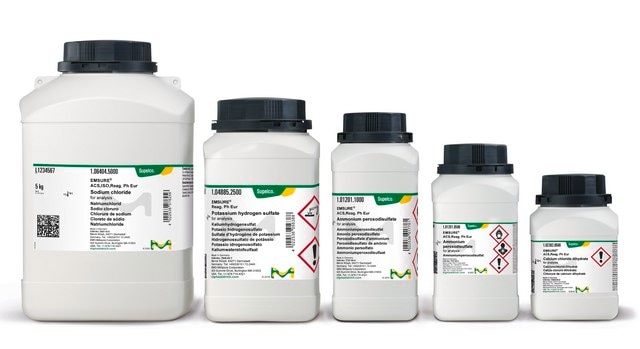298328
Lithium chloride hydrate
≥99.99% trace metals basis
Synonym(s):
Hydrochloric acid lithium salt hydrate, Lithium Chloride monohydrate
About This Item
Recommended Products
Quality Level
assay
≥99.99% trace metals basis
form
crystalline
impurities
≤100.0 ppm Trace Metal Analysis
SMILES string
[Li+].[Cl-].[H]O[H]
InChI
1S/ClH.Li.H2O/h1H;;1H2/q;+1;/p-1
InChI key
VXJIMUZIBHBWBV-UHFFFAOYSA-M
Looking for similar products? Visit Product Comparison Guide
Related Categories
signalword
Warning
Hazard Classifications
Acute Tox. 4 Oral - Eye Irrit. 2 - Skin Irrit. 2 - STOT SE 3
target_organs
Respiratory system
Storage Class
11 - Combustible Solids
wgk_germany
WGK 1
ppe
dust mask type N95 (US), Eyeshields, Gloves
Certificates of Analysis (COA)
Search for Certificates of Analysis (COA) by entering the products Lot/Batch Number. Lot and Batch Numbers can be found on a product’s label following the words ‘Lot’ or ‘Batch’.
Already Own This Product?
Find documentation for the products that you have recently purchased in the Document Library.
Customers Also Viewed
Articles
Research and development of solid-state lithium fast-ion conductors is crucial because they can be potentially used as solid electrolytes in all-solid-state batteries, which may solve the safety and energy-density related issues of conventional lithium-ion batteries that use liquid (farmable organic) electrolytes.
Our team of scientists has experience in all areas of research including Life Science, Material Science, Chemical Synthesis, Chromatography, Analytical and many others.
Contact Technical Service




